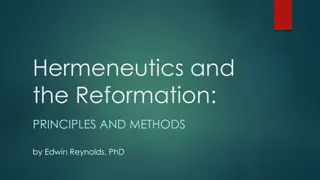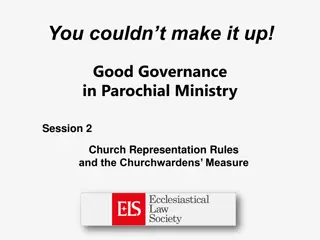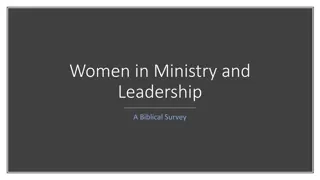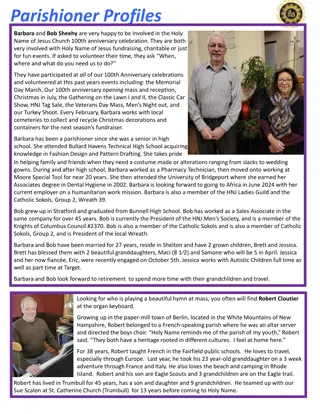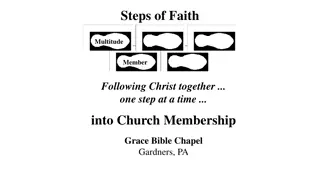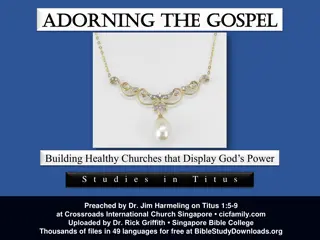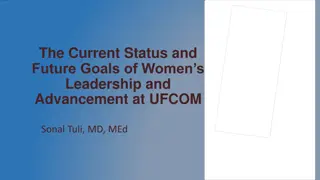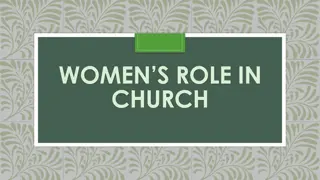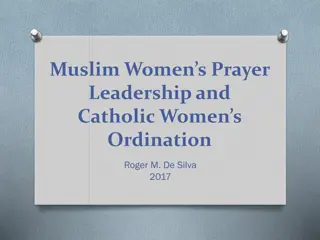
Biblical Case for Women in Church Leadership: A Thoughtful Perspective
Delve into the biblical narrative regarding women in church leadership, explore challenging passages from Corinthians and Timothy, unravel hermeneutical insights, and discover the inclusive message of Galatians. Reflect on the flow of the biblical story and the implications for gender roles in the church.
Download Presentation

Please find below an Image/Link to download the presentation.
The content on the website is provided AS IS for your information and personal use only. It may not be sold, licensed, or shared on other websites without obtaining consent from the author. If you encounter any issues during the download, it is possible that the publisher has removed the file from their server.
You are allowed to download the files provided on this website for personal or commercial use, subject to the condition that they are used lawfully. All files are the property of their respective owners.
The content on the website is provided AS IS for your information and personal use only. It may not be sold, licensed, or shared on other websites without obtaining consent from the author.
E N D
Presentation Transcript
A BIBLICAL CASE FOR WOMEN IN CHURCH LEADERSHIP
A Biblical Case for Women in Church Leadership Orienting Observations about the Bible. The flow of the whole biblical story. Two difficult passages: 1 Corinthians 14; 1 Timothy 2
Orienting Observations Hermeneutics: the art and science of proper interpretation. What is the appropriate way to understand a text of the Bible (or any document)?
The flow of biblical story If one read Genesis 1 2, and didn t know anything went wrong, you would never wonder whether women could lead. If one read Genesis 1 2 and then Revelation 21 22, one would know something dreadful went wrong, but still you wouldn t wonder if women could lead. If Jesus brings remedy for all that is wrong, we should expect a redemption that restores the relational realities of Gen. 1 2.
The flow of biblical story Whatever Paul meant in I Cor. 14 and 1 Tim. 2, should not nullify the clear indications from elsewhere in Scripture.
TWO DIFFICULT PASSAGES If scripture clearly says women shouldn't teach or exercise authority over a man, shouldn't the church follow that rule? Two passages seem to suggest this, but there are reasons to question this. What does scripture clearly teach? Right Question but not as simple as it seems.
Galatians 3: 28 28 There is neither Jew nor Gentile, neither slave nor free, neither male nor female, for you are all one in Christ Jesus.
Galatians 3: 25-29 Paul speaks of all three sets of social pairs (ethnic, class, gender) in the same way. Being in Christ means : These categories do not limit whether one may belong to the family of God; nor do they limit how they may participatein the church of Jesus.
Galatians 3: 25-29 On the basis of this text, this scripture passage, we would conclude that being male or female does not determine either membership or ministry. What makes people almost automatically assume that 1 Cor. 14 and 1 Tim 2 trump the teaching of Gal. 3:28?
1 Corinthians 14:31-40 31For you can all prophesy in turn so that everyone may be instructed and encouraged. 32The spirits of prophets are subject to the control of prophets. 33For God is not a God of disorder but of peace--as in all the congregations of the Lord's people.
1 Corinthians 14:31-40 34Women should remain silent in the churches. They are not allowed to speak, but must be in submission, as the law says. husbands at home; for it is disgraceful for a woman to speak in the church. people it has reached? 35If they want to inquire about something, they should ask their own 36Or did the word of God originate with you? Or are you the only
1 Corinthians 14:31-40 37If any think they are prophets or otherwise gifted by the Spirit, let them acknowledge that what I am writing to you is the Lord's command. forbid speaking in tongues. 38Those who ignore this will themselves be ignored. 39Therefore, my brothers and sisters, be eager to prophesy, and do not 40But everything should be done in a fitting and orderly way.
1 Corinthians 14:31-40 Paul is responding to a number of issues and questions (see 7:1, concerning the things you wrote about, also 7:25; 8:1; 12:1). V. 31 mentions prophesying, as does v. 32. V. 37 and v. 39, again, refer to prophets and prophecy. The context: chaotic worship practices and questions about the use of tongues, whether unknown or in the form of prophetic utterance.
1 Corinthians 14:31-40 In v. 34, Paul says, Women should remain silent in the churches. That is the Today s NIV version. Literally, the Greek reads, TheWomen are to be silent In Greek grammar (don t fall asleep, this is the last mention of Greek! ) This verse either says women in general should remain silent; they are not to speak. Or it says, the women, that is, certain ones whom you know very well, should remain silent and are not to speak.
1 Corinthians 14:31-40 Paul has already stressed that, in fact, women in general do not and should not remain silent. Chapter 11: 5, 13. If it is women in general, Paul is contradicting what he says in chapter 11. If he refers to a specific group of women not so. This makes good sense of what Paul then tells them: they should ask their own husbands for it is disgraceful for a woman to speak in the church.
1 Corinthians 14:31-40 If Paul refers to some women who disrupt by talking and asking questions or otherwise commenting during the worship times, it makes sense to write what he does to them. It also doesn t require Paul to contradict what he says in chapter 11. Interpreters who insist Paul is prohibiting all women do not themselves really heed what Paul says. He says women in general are to be silent in church period! Some soften this by saying, Paul means they shouldn t teach or preach, but Paul says they shouldn t speak or talk at all!
1 Timothy 2:8-15 8Therefore I want the men everywhere to pray, lifting up holy hands without anger or disputing. adorning themselves, not with elaborate hairstyles or gold or pearls or expensive clothes, God. 9I also want the women to dress modestly, with decency and propriety, 10but with good deeds, appropriate for women who profess to worship
1 Timothy 2:8-15 11A woman should learn in quietness and full submission. 12I do not permit a woman to teach or to assume authority over a man; she must be quiet. 13For Adam was formed first, then Eve.
1 Timothy 2:8-15 14And Adam was not the one deceived; it was the woman who was deceived and became a sinner. 15But women will be saved through childbearing--if they continue in faith, love and holiness with propriety.
1 Timothy 2:8-15 Again note the context: In Ephesus Timothy is facing controversies, arguments, and wrong teaching (see chapter 1). Paul repeats the call for silence for a woman who should learn in silence (same word as in 1 Cor. 14) and complete submission. Then Paul says, I do not permit a woman to teach. But is that really true absolutely? (Note indications to the contrary.) I do not allow women to assume authority over a man; she must be quiet. Assume authority is very rare and it means to dominate or lord it over.
1 Timothy 2:8-15 Paul s preface to these instructions for women, on modesty, dress and hairstyle, suggests these were gentile women flaunting their freedom in Christ. The problem: they are not qualifiedto teach and yet they dominate others, and may even be deceived. The strange reference to first sin; citing Eve and the deception is very odd for Paul (compare Romans 5 and 1 Corinthians 15).
1 Timothy 2:8-15 Paul instructs, or commands (v. 8), that when men pray they should lift up holy hands. Paul commands certain styles of dress, jewelry, and hair for godly women. These commands about men and women are in the same passage as the silencing of women, yet are not taken as applicable. On what basis?
TWO DIFFICULT PASSAGES Not all questions have been answered. Remember what Peter said about some of what Paul wrote. They are hard to understand (see 2 Peter 3:16)! These two passages aredifficult, especially in light of other things that Paul himself says quite clearly.
TWO DIFFICULT PASSAGES A good hermeneutic will not allow two difficult passages to trump the clear movement of the whole biblical story. The limitations on women in history result from sin and its brokenness. In the beginning God created the man and women as co- stewards and co-trustees of the world he created.
TWO DIFFICULT PASSAGES Sin messed up these and all other relationships resulting in horrendous woe and evil. The redemption in Christ Jesus undoes this sin and its damage. We are a new kind of humanity in Christ that approaches by grace the restoration of what God intended in the beginning.
Why does this matter so supremely? We should care about what God intended in the beginning. Mission accomplishment will require all God s people fully empowered and totally engaged. More than half of the people are women. If we would love God, love people, and make disciples: we must create space and opportunity for all women to engage in every way God calls and gifts them.




